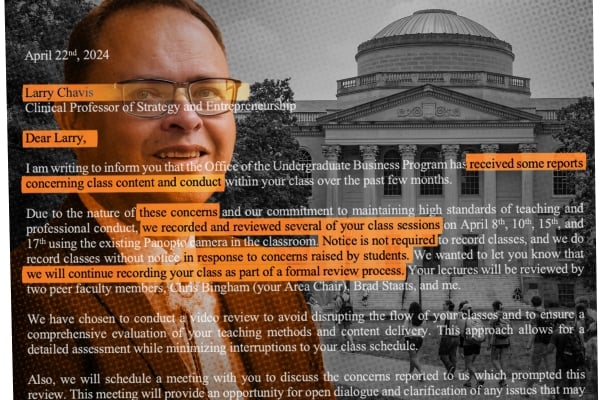A recent letter sent to faculty members at the University of North Carolina (UNC) Chapel Hill has raised concerns about the university’s practice of secretly recording professors during classes and meetings. The letter, which was obtained by local media outlets, states that “notice is not required” when it comes to recording faculty members in English.
The letter, which was reportedly sent by the university’s Office of Institutional Integrity and Risk Management, goes on to explain that the recordings are being made for “quality assurance purposes” and are intended to help improve teaching and learning at the university. However, many faculty members are troubled by the secretive nature of the recordings and are questioning the legality and ethics of the practice.
Professor Sarah Johnson, who teaches English literature at UNC Chapel Hill, spoke out about her concerns regarding the recordings. “As a professor, I value the privacy and trust of my students and colleagues,” she said. “The idea that my words and actions could be recorded without my knowledge or consent is deeply troubling.”
The letter claims that the recordings are being made in accordance with the university’s policies and procedures, but some faculty members are calling for greater transparency and accountability in the recording process. They argue that professors should have the right to consent to being recorded and should be made aware of when and how their recordings will be used.
In response to the letter, a spokesperson for UNC Chapel Hill issued a statement saying that the university is committed to ensuring the privacy and confidentiality of faculty members. The statement also emphasized that the recordings are being made in accordance with legal guidelines and are intended to improve the overall educational experience for students.
The controversy over the secret recordings at UNC Chapel Hill highlights the ongoing debate over privacy and transparency in higher education. As technology continues to advance, universities across the country are grappling with how to balance the benefits of data collection and analysis with the rights of their faculty and students.
It remains to be seen how UNC Chapel Hill will address the concerns raised by faculty members in response to the letter. In the meantime, professors like Sarah Johnson are urging their colleagues to be vigilant and to advocate for greater transparency and accountability when it comes to the recording of lectures and meetings. Ultimately, the privacy and trust of faculty members must be respected in order to uphold the integrity of the academic community.



